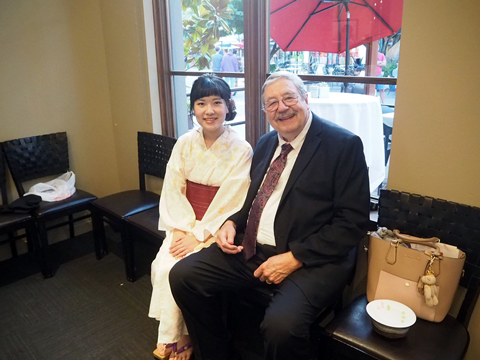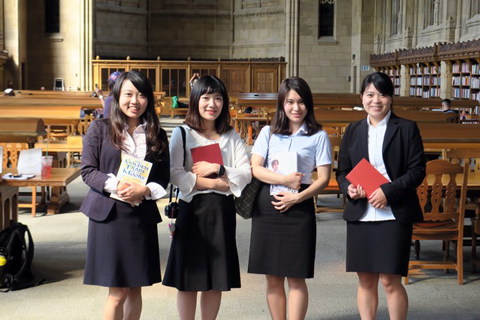国際・国内交流
井上 増美さん(第5学年次)
シアトルでの研修を終えて
私は今回、8月4日から11日に渡って、シアトルのワシントン大学における生命倫理のプログラムに参加させていただきました。私がこのプログラムに参加しようと思ったのは、特に今まで生命倫理について深くは考えたことはありませんでしたが、臨床実習を通して将来どの科に進んだとしても医師には必須の知識だと感じていたからです。また英語は苦手ですが、海外の医療について興味を持っており、今までに留学経験がなかったため応募させていただきました。患者と接する機会が多い臨床実習を行っている今だからこそ、日本と海外での違いを実感してみたいと感じました。初めて訪れたシアトルは何もかも新鮮に感じることが出来ました。そのような環境の中、到着して3日目から授業が始まりました。先生方の講義はどれも興味深く、印象的なものばかりでした。その中でも特に関心を抱いたことについて述べさせていただきます。
授業初日はワシントン大学を訪れました。すごく大きな大学で、大学構内はバスなどで移動しなければならないほどでした。大きな噴水もあり、このような開放的な環境で学習できることにとても期待感を抱きました。この日の授業で最も印象に残ったのはFamily Medicineについてです。いわゆる”家庭医療”と言われるものですが、日本ではまだあまりない考え方です。日本でいう、かかりつけ医という考え方にも少し似ていますが、出産や終末期、生まれた子を小児期から成人まで、とすべての年齢を診る、という一貫した医療が行われていることに大変関心を抱きました。患者との信頼関係を築いたうえで、インフォームド・コンセントを行い、適切に治療することが大事だと考えられていますが、家庭医はまさに患者との信頼関係を最も深く築ける存在なのではないかと感じました。医療での最初の接点となる家庭医と患者が深い関係を築くと、患者の健康への意識が高まるため、予防医学がより普及して、医療費の問題も改善するのではないかとも考えます。高齢化社会であるからこそ、かかりつけ医よりも気軽にアクセスできる家庭医の存在が重要視されるべきだと思うし、家庭医療がまさに全人的な医療と言えると感じました。
授業2日目にはChaplainという職業の話を伺いました。Chaplainとは患者の”Spiritual”な面をサポートされる方々です。そもそも私は医療における”Spirituality”を考えたことがありませんでした。このような考え方は様々な宗教を信仰する人が多く集まるアメリカだからこそ、重要視されるのだと感じました。日本で”Spirituality”という考え方はあまり聞いたことがなく、というのも日本人は無宗教の人が多い上に、疑い深い人種であるからなのではないかと思います。”Spirituality”という考え方には宗教的な一面だけでなく、自尊心や病気による不安感、対人関係など、様々な個人の考えが含まれます。患者が抱く悩みや不安はもちろん1人1人異なるため、特に緩和ケアにおいては個別の対応が重要だと考えられます。しかし医師だけでは時間を設けて対応しきれないので、Chaplainのような専門的な職業が日本にも存在するべきだと感じました。授業3日目は朝からKidney Centerを見学させていただきました。この施設は世界で初めて人工透析が行われた場所だと聞き、自分がそのような場所にいることにとても驚きました。そこでも日本とアメリカとの医療の違いを感じました。また午後には有名な映画の舞台にもなっているHarborview Medical Centerを見学させていただきました。とても大きい病院で施設内の壁や屋上の庭に、患者のために工夫して施されたデザインがとても綺麗で、病院とは思えないほどの明るい雰囲気で、私もこのような環境で働きたいと感じました。授業4日目はワシントン大学でお話を伺いました。この日一番印象に残ったのは、尊厳死法についてです。私の知識不足ではありますが、このような法律が世界で存在していることを知りませんでした。実際にアメリカで尊厳死法が施行されているのは7州しかありませんが、DWDA処方受領者数と死亡者数は年々増加しており、高齢化に伴ってさらに増加すると考えられ、新たな倫理的問題が生じうると考えられます。先生に尊厳死を希望する患者本人と患者家族の意見が食い違った場合どのような対応をするのか質問させていただきました。先生はやはり患者本人の自律性を尊重すべきなので、時間をかけて家族とも話をし、納得してもらう、とおっしゃっていました。このような法律が存在するのは、個々の自律性の尊重をとても大切にしているアメリカならではのことだと感じました。苦痛を取り除くことが出来るという選択肢が患者に与えられるというメリットもありますが、患者自ら命を絶つために医師が薬を処方するのは、患者に害を与えないという点で行ってはいけないのではないかと考えます。様々な賛否両論があり、これからも議論されるべき問題であるということを実感しました。今回の研修で私は初めてアメリカを訪れました。シアトルに到着すると、まず広々とした街並みが印象的でした。中心地に行くと、AmazonやGoogle、Microsoftなどの世界的に有名な会社の拠点があり、すごく都会だということを実感しました。ホテルからはPike Place Marketやスターバックスコーヒーの1号店まで徒歩で行くことが出来るため、初日の夕食後に散歩して様々な場所を訪れることが出来ました。また2日目に訪問したワシントン大学のBook Storeでは大学のグッズの多さに圧倒されました。Pike Place Marketでは魚屋で魚を投げている風景も見ることが出来ました。シアトルでの食事はどれも美味しく、中でもWelcome Partyで食べた大きなサーモンや、綺麗な景色を見ながら食べたクルージングの際の料理はとても印象的で、すごく素敵な思い出です。今回の研修では本当に思い出深い貴重な経験をさせていただきました。上記に述べさせていただいたお話以外にも、アメリカの保険制度の話、感染症の話、移植の話など、様々な面から倫理について考えることが出来ました。McCormick先生が最初に授業してくださったFour Box Methodの考え方に沿って、倫理的に問題に直面した際に対処出来るように、日々倫理的問題に気づき、認識できるようになりたいと思います。最後になりましたが、このような素敵な機会を与えてくださった枚方療育園の山西先生をはじめ、関先生、中野先生、富田先生、引率してくださった金沢さん、梶原さん、シアトルで授業をしてくださったKing先生、McCormick先生をはじめとする先生方、ありがとうございました。

